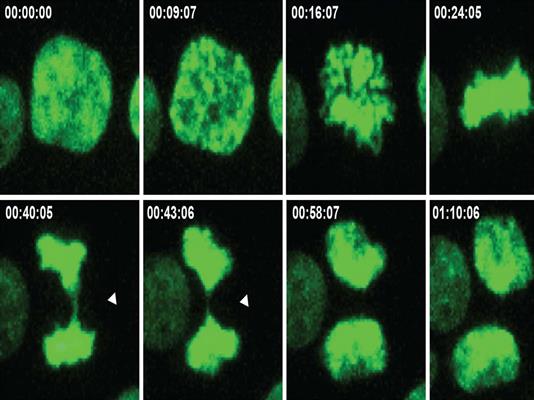February 25, 2020 -- Researchers are developing human cell lines to explore how extra copies of chromosomes can enhance the metastasis and invasiveness of cancer cells. They explained their methodology in a study published in Developmental Cell on February 24.
Cancer cells are notorious for genetic disarray, with nearly all malignant tumors displaying aneuploidy. Aneuploidy is the imbalance that occurs when cells are have either missing or extra copies of single chromosomes; it can alter the dosage of hundreds or thousands of genes and their expression. As cancer progresses, so does aneuploidy.
High levels of aneuploidy are associated with aggressive cancers and poor prognosis for patients. However, the role that aneuploidy plays in malignancy remains poorly understood. In some cases, aneuploidy inhibits cell proliferation and suppresses tumorigenesis, while in other cases it can increase the dosage of growth-promoting oncogenes that lead to tumor growth.
A research team at Cold Spring Harbor Laboratory developed an approach in which the chromosome copy number can be altered in an otherwise-identical background, allowing researchers to isolate and study the effects of aneuploidy without secondary alterations. The modified cell lines revealed that single-chromosome gains can have multifaceted effects on the metastatic ability of cancer cells.

In the study, 12 out of the 13 different trisomies (three sets of a chromosome) inhibited or had a minor effect in assays that simulate invasiveness and cell motility of cancer cells. HCT116 colon cancer with an extra copy of chromosome 5 was unique in that it displayed a clear increase in metastatic capacity. The specific amplification of chromosome 5 was found to silence epithelial cell-adhesion genes. As a result, cancer cells promote migration out of the primary tumor site and into circulation.
"Since highly aggressive cancers tend to be aneuploid, we expected that all or most aneuploidies would contribute to metastatic behavior," said senior author Jason Sheltzer, PhD, from Cold Spring Harbor Laboratory investigator in a statement. "But it is actually a more complicated relationship. We found that different chromosomes can have all sorts of different impacts."
Moreover, the team found that aneuploidy can be a reversible process (gaining and losing chromosomes through chromosome instability) that can contribute to tumor plasticity and allow cancer cells to switch between different phenotypic states.
In tests in which metastasis was inhibited, the researchers suggest that changes in trisomic cell lines induced proteome deregulation that interfered with the processes necessary to achieve metastasis.
Analysis of clinical data revealed that aneuploidy-associated patient mortality exhibits distinct clinical associations in different cancer types. For instance, chromosome 10 losses are associated with poor survival in gliomas and kidney cancers, but chromosome 10 gains are associated with poor survival in leukemia and hepatocellular carcinoma.
In the future, the researchers plan to use their new aneuploid cell lines to screen for potential drugs and genetic changes that eliminate cancer cells by targeting these abnormalities.
Do you have a unique perspective on your research related to cell line development and cancer research? Contact the editor today to learn more.
Copyright © 2020 scienceboard.net


